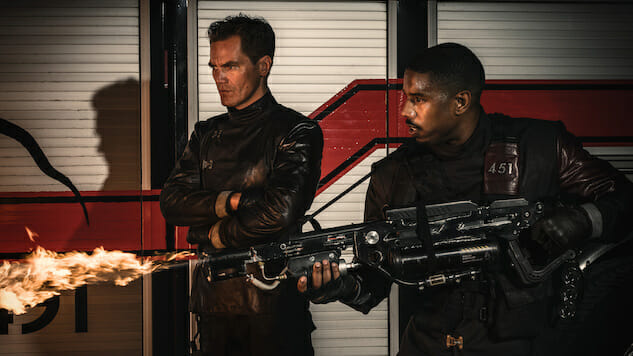How Did HBO’s Adaptation of Fahrenheit 451 Go So Wrong?
Photo: Michael Gibson/HBO
What could be more timely, more hot-damn needful, more cautionary-tale-tastic at this moment than a movie adaptation of a paranoid dystopian 1950s novel about a media-saturated anti-culture obsessed with book-burning?
Arguably, absolutely nothing. Just as Hulu’s adaptation of a 1980s speculative fiction about socially normative repression, dehumanization and ritual rape of all human females has taken on a freakish timeliness in the current social moment, surely there could be no riper time for a rebirth of Ray Bradbury’s (rather didactic) Fahrenheit 451? I remember the paperback copy I had in high school. “The temperature at which books burn,” was the tag line. Because apparently they didn’t expect you to put that together from the title. Spoiler alert: Some Things Never Change.
I’ve gone on at length about my own surprise at the deft, deep, thoroughly striking re-tool of Margaret Atwood’s The Handmaid’s Tale, which for this viewer seriously improves on its source material. But they have a lot in common. Both originate with grim, dystopian visions of an alternate reality or future where “educated” is a huge-ass problem. Both were previously made into feature films (Fahrenheit 451 was first tackled by the legendary François Truffaut in 1966). They both feel suspiciously of-the-moment for books that are more than a quarter century old, and they both address concerns that might feel kinda-sorta real or epically, insanely real to you at this moment in time. And both of them happened to be novels I found uncomfortably pedantic and obvious when I first read them as a teenager.
So I was primed for another “wow” moment with HBO’s adaptation of Fahrenheit 451. And I got one. Just a different tenor of “wow” than I anticipated. As in: Wow, this is ham-fisted. Wow, this is a waste of precious, precious Michael B. Jordan minutes. Wow, this movie is even more pedantic than the book.
Wow, I am watching a bunch of monstrosity fascist “firemen” chanting “Time for America to burn again!” and I might have just had an unpleasant revelation about why certain kinds of entitled shit-disturbers feel entitled to be shit-disturbers. And none of our hands are totally clean.
Bradbury’s novel was, to select a too commonly and too lazily applied descriptor, an iconic sign of its time, reflecting the somnolent unease of the postwar McCarthy era, with the rising tides of television, suburbia, social disaffection and the paranoia of the Cold War. Its landscape is the clear (the oh, so very clear) product of the triumph of Those Who Would Eradicate Knowledge Because Knowledge Is Power. Of course it’s a sobering notion in 2018 unless you have spent most of your life in a walk-in closet. Michael B. Jordan’s life as troubled fire (starting) man Guy Montag is so real it’s unreal and so unreal it’s, like, really real, no?
To get real here: Jordan’s a badass and his performance is the thing about this film. It’s so good I wish he’d gotten to save it for a movie worthy of his own subtlety (which a flippin’ Marvel superhero SFX-a-palooza was able to give him; even my children walked out of Black Panther stunned by the brilliance of Killmonger’s character arc and spontaneously erupting into a frighteningly nuanced discussion of “privilege”). He’s top-drawer on the slow-dawning revelation that things are much, much more legitimately complicated than he gave them credit for in Act I.
Beyond Jordan’s wonderful performance, I am afraid we are rather in the weeds, my dudes. Because for whatever reason practically no one has the self-control to get the eff off their high horse and notice that it’s always more complicated than it seems in Act I and that pedantry is a terrible, terrible way to persuade anyone of anything. It is perhaps the most glitteringly terrible way to persuade people you think are ignorant to agree with you and say “Why, yes, yes I am, and I should get right to work on fixing that shit.” Ramin Bahrani’s reimagined, near-future Fahrenheit isn’t interested in upping the subtlety game in its quest to make us all finally understand that fascism has unfortunate repercussions. It’s even less subtle than its literary ancestor and it doesn’t have the lack of 20/20 hindsight to excuse it, as we’ve had comfortably over half a century to reflect on the rise of fascism and its various genocidal outcomes. And a good 21 centuries to reflect on book-burning, at least—at least—going back to the No Good Very Bad Day when a pretty famous Roman emperor “accidentally” went full-tilt Count Olaf on the Library of Alexandria in 48 BCE.
It’s a potent image. Considering words are the spoken or written ghosts of ideas, it’s a shockingly visceral thing to see a book burn. Hitler knew it. The Spanish Inquisition knew it. Everyone knows it. Burning books is one of the most unambiguous metaphors there is. And Bahrani would like you to know that there is no “No books were harmed in the making of this film” disclaimer: They were torched en masse, ferrealski, no stunt doubles, baddabing. For emphasis. I guess. Because apparently no one trusts you to get it otherwise. No one believes you have the capacity to wake the eff up and hashtag-resist so they need to smoosh it in your face that the ultimate outcome of our smartphone-myopic, deep-state data-mined, fake news-opiatized lives is a fricking Biblical conflagration. Oh, did I lose you? Do you have a crowded theater in which I can yell it? Fire. FIRE. This is your brain on fire. The blaze has already claimed a number of high-profile victims. Thinking for yourself. Expressing feelings without emoji. Humor. Subversiveness. Subversive humor. Freedom. Non-artifical intelligence. Joy. Self-actualization. Innovation. The Flying of Your Freak Flag. Iconoclasm. Resisting without requiring a hashtag, a selfie, or a “platform.” And it is spreading, rapidly, toward a TV screen near you.